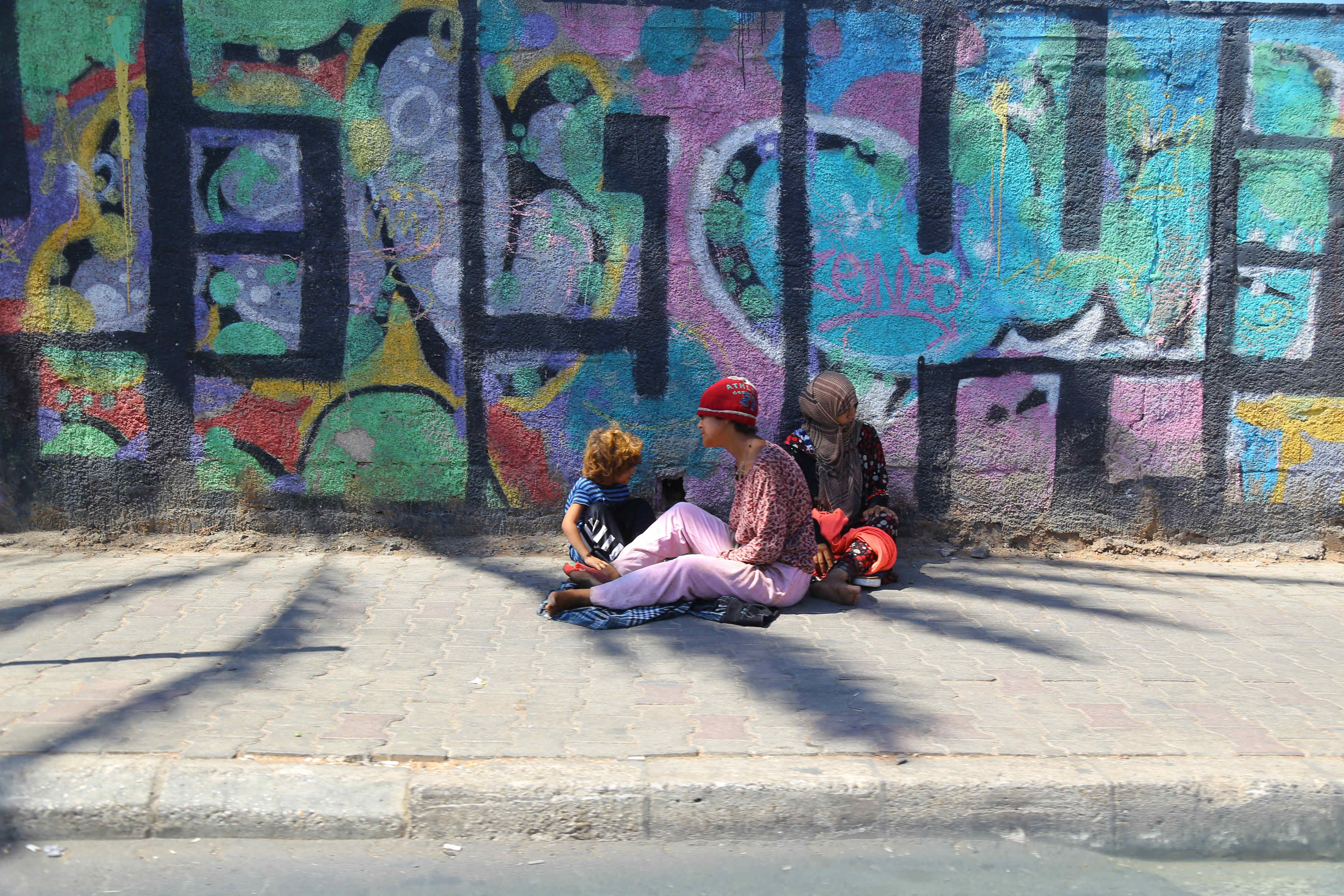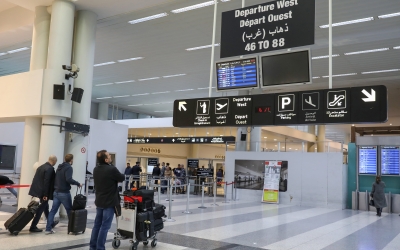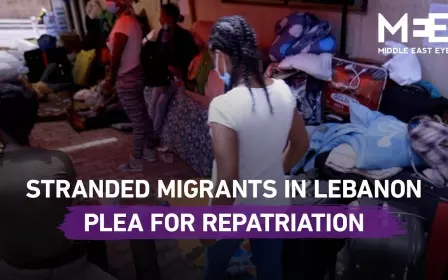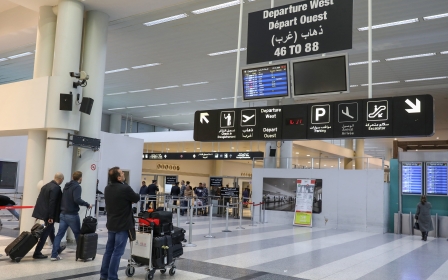'The kids miss the sweets': Lebanese face difficult choices amid economic collapse

A man on a motorcycle passes a large group of people gathered in a narrow street facing Beirut’s luxurious hotels. He asks an elderly man taking part in the gathering: “What is the protest about?"
The old man replies: “It is not a protest - we are waiting to receive our monthly government aid.”
As the economic and financial crisis deepens in Lebanon, exacerbated by the coronavirus pandemic, Lebanon's government passed an emergency aid plan in April for the most vulnerable.
The initiative consists of giving a monthly aid payment of 400,000 Lebanese pounds ($80) to help around 122,000 families heavily affected by the crisis.
The plan has been seen by many activists as a desperate step to try to calm growing public frustration at the country's economic “free-fall,” a term used by the government itself in its recovery plan published last month.
New MEE newsletter: Jerusalem Dispatch
Sign up to get the latest insights and analysis on Israel-Palestine, alongside Turkey Unpacked and other MEE newsletters
'Prices for goods skyrocketed'
Mohamad, 45, is a taxi driver and a beneficiary of the plan as a result of being on the government's most vulnerable list.
Before the crisis, when money was not a problem, Mohamad had a monthly “ritual”.
At the beginning of every month, he visited a local Arabic sweets shop, considered to be “high end,” and waited in line to buy treats for his children.
“It was my way of showing my kids they are not any different than other well-off families,” he told Middle East Eye.
Today the monthly “ritual” has changed. Now, at the beginning of each month, Mohamad has to wait in line in a different queue - lining up for his monthly aid in order to provide the basic needs for his family.
When asked if the amount was sufficient, Mohamad says that it barely covers the cost of basic commodities for two weeks.
“As the local currency plummeted to the dollar, the prices for goods skyrocketed,” said Mohamad.
When things were normal, he says, an amount of 400,000 Lebanese pounds, which was then equivalent to 270 dollars, used to cover the expenses for groceries and basic needs for the entire month. Now it barely suffices for a week.
When asked how will he manage, he simply replies: “God is merciful, but the kids sure do miss the monthly Arabic sweets.”
One million unemployed warning
A study published by Information International, a Beirut-based research firm, estimates that the economic crisis facing Lebanon will most likely result in the unemployment rate increasing to 65 percent of the workforce.
The study states that while there is no clear official data concerning the current rate, it is estimated that around 350,000 workers, 25 percent of the workforce, were unemployed prior to 17 October 2019, when protests first began against the government.
As the situation deteriorated, 80,000 workers were laid off, increasing the total number to 430,000.
The study estimates that if no emergency steps are taken, Lebanon could face one million unemployed for the first time in its history.
In March 2019, Jad, a 34-year-old father of two, was laid off work as a restaurant manager at one of Lebanon's best-known restaurant chains.
Jad says he was injured in a work accident and that the company refused to give him paid sick leave.
"I did not accept to be deprived of my work rights and threatened to sue them, so they decided to fire me; now we have the courts between us," he told MEE.
Jad, who holds a degree in hospitality management and has years of experience, thought it would be easy to find another job, but the crisis cut things short.
After several months of being unemployed, and with the crisis deepening, it was essential for him to provide for his family.
In September 2019, he decided to open an indoor restaurant at his house in the village of Hamat in northern Lebanon.
"As I looked at the crashing market, I knew I had to take matters into my own hands, I have a family to take care of," he said.
Fears for children's health
Just as Jad's little project had started to pick up, the October protests led to the currency plummeting, and since most of the goods he uses are imported, Jad started to find it hard to balance the books.
"Most of my clients are locals from my village, they like my recipes, but it is hard to sell prepared food to people that are tightening their economic grip in fear of what might come," he said.
With a failing project, and bills accumulating, Jad faces two dire options.
Unable to pay rent, he says he might have to move into his parents' house with his wife and kids, or move his older son from a private school to a public school.
This is something he is not keen to do as Lebanon is known to have a poor public school system.
"I will exert all options before I deprive my kid of a good education," he says.
However, Jad's fears extend to an even more concerning issue. His seven-year-old son suffers from a kidney disease that requires medication that is subsidised by the state.
With ongoing talks about the government cutting the subsidies on medicines, Jad explains in tears that his fear for his son's future are not just academic.
Young people may leave
When asked about a similar historical phase that Lebanon has been through, former finance minister Georges Corm anticipates a dark future for the country's population.
Corm, who served from December 1998 to October 2000, says the only period comparable with what Lebanon is going through now is the civil war from 1975 to 1990.
He argues that the economic and financial collapse Lebanon is facing is no different to the gradual collapse the country faced over 15 years of fighting.
The difference now is the rapid pace, Corm says, citing the comparison between the crash of the Lebanese pound last year, and the gradual crash it suffered over 15 years.
'Those who cannot seek an alternative outside will be stuck here, and, as poverty grows, social unrest will intensify'
- George Corm, former finance minister
"A year ago, the dollar was equivalent to 1,500 Lebanese pounds, today it has spiked to over 5,000 Lebanese pounds," he told MEE.
On Wednesday, the pound traded at 6,300/6,500 on the parallel market, meanwhile some Lebanese reported that it hit 7,000.
Corm says that the country will face a demographic transformation if rapid action is not taken.
He agrees with the notion of an exodus of the country's youth once the coronavirus crisis is over and the airport reopens.
"We might become an elderly population, while the young workforce abroad try to help their families back home," he said.
"Those who cannot seek an alternative outside will be stuck here, and, as poverty grows, social unrest will intensify."
In a country with an armed population, this might lead to catastrophic scenarios, Corm argues.
White pennies for black days
Lebanon's banks have applied strict capital controls since the October protests began and the currency started to lose its value.
With a shortage of dollars due to the monetary crisis, the fastest way to procure dollars was often to sell gold.
The business of loaning gold became familiar to many Lebanese households who were unable to obtain bank loans.
Customers receive a loan based on the value of the gold they deposited, then agree a regular payment plan through which the gold is returned to them once it has been completed.
However, when the crisis emerged, the gold investment companies demanded investors pay back their loans in dollars, or in Lebanese pounds according to the black market rate, or they would confiscate their gold.
Fatima, 29, is one of many young women who chose to invest their gold in return for money.
Her monthly repayment before the crisis hit had accounted for 20 percent of her salary, but now her repayment is higher than her total salary, which was cut by 30 percent.
"I am trying to pay back my loan entirely by all means just so that I can get back the gold that I have invested," Fatima told MEE.
"Save your white penny, for your black day," is the famous Arabic saying that now drives Fatima. However, she never imagined in her darkest days that her white penny (her gold) might be jeopardised.
When asked about her desperation to get back her gold, Fatima explains that her employer has already cut 30 percent of her salary which in turn had already lost most of its value to the dollar - and with the increasing speed of how things are heading she expects further cuts.
Therefore, she says, her only safety net is the gold that she has invested.
"If, God forbid, I lost my job, this gold will help me survive for a couple of months, until I figure out what to do," said Fatima.
When asked what she will do if the situation worsens, she replies: "The airport will open on 1 July."
This article is available in French on Middle East Eye French edition.
Middle East Eye delivers independent and unrivalled coverage and analysis of the Middle East, North Africa and beyond. To learn more about republishing this content and the associated fees, please fill out this form. More about MEE can be found here.








